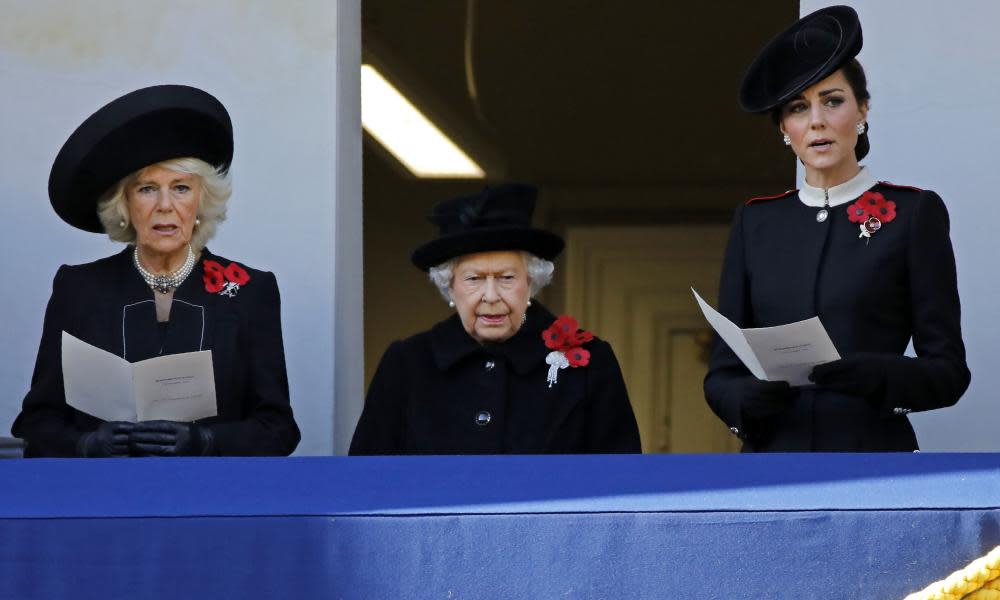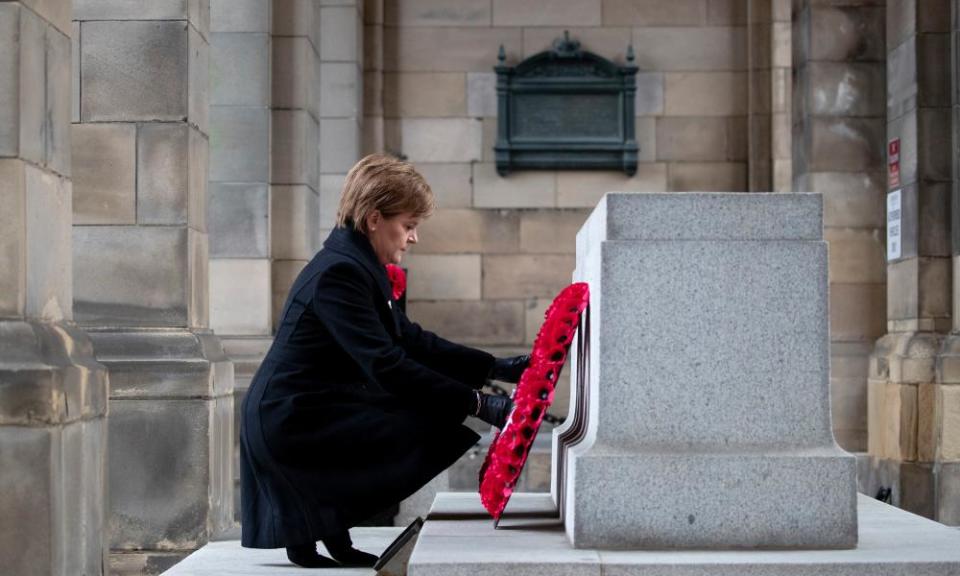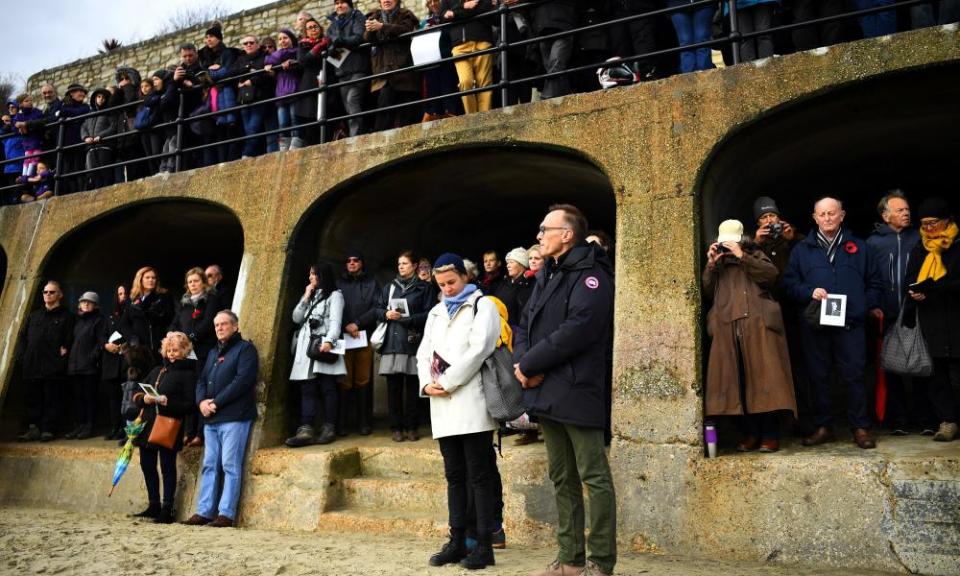People gather around world to mark armistice centenary

If the British empire’s dead of the first world war had marched four abreast down Whitehall, the founder of the Imperial War Graves Commission, Sir Fabian Ware, observed some years afterwards, it would have taken them three and a half days, walking day and night, to pass the Cenotaph.
On Sunday, a century after the first world war was finally brought to an end, the Queen, Britain’s political and military leaders and tens of thousands of veterans and members of the public gathered once again in central London to pay their respects to them and the war’s many millions of other casualties, the vast scale of its waste no easier to comprehend now than it was at its conclusion.
At the stroke of 11am, the time the armistice signed by the allied powers and Germany came into effect a century earlier, the dense crowds packed into Whitehall fell absolutely still to observe the two minutes’ silence.
Prince Charles then laid a wreath on the Cenotaph steps on behalf of the Queen, who at 92, was watching from a nearby balcony. He was followed by the German president, Frank-Walter Steinmeier, the first time a representative of Britain’s former foe had taken part in the national service of remembrance.
Later, Steinmeier joined the Queen and other royals at a remembrance service at Westminster Abbey where the Dean of Westminster, Dr John Hall, prayed for a time when conflict was “transformed into friendship and collaboration”.

The ceremonies in London were echoed in countless acts of commemoration, large and small, in Britain and across the world, reflecting the extent of hostilities that claimed 40 million military and civilian casualties worldwide.
Global commemorations centred on France, the crucible of much of the conflict, where more than 60 heads of state and government gathered at the Arc de Triomphe in Paris. As well as a monument to Napoleonic victories, it is also contains the grave of an unknown soldier of the first world war.
Among those joining the French president, Emmanuel Macron, were Donald Trump, Vladimir Putin, Angela Merkel and Leo Varadkar.
In pouring rain, most heads of state arrived in coaches driven up the Champs Élysées from the presidential palace. They then walked slowly together in a snaking line under black umbrellas to the Arc de Triomphe, Merkel beside Macron, Justin Trudeau next to Recep Tayyip Erdoğan.
The image of leaders walking together through the rain was described by French commentators as a moving gesture of peace, but there were two notable absentees, both Trump and Putin arriving separately with their own security details.
Macron’s speech, in turn, was pointedly political, warning that “old demons” were resurfacing that threatened the fragile peace and highlighting the dangers of countries putting their own national interests first.
Patriotism, he said, “is the exact opposite of nationalism. Nationalism is a betrayal of patriotism. In saying, ‘our interests first, whatever happens to the others’ you erase the most precious thing a nation can have, that which makes it live, that which causes it to be great and that which is most important: its moral values.”
Trump, who said recently he was proud to be a nationalist, looked on without visible reaction.
Theresa May was absent from the French commemorations. The prime minister opted to send Cabinet Office minister, David Lidington, to Paris, as she stayed in London to lay a wreath at the Cenotaph as usual alongside the Labour leader, Jeremy Corbyn, and other political and military leaders and senior royals.

As well as the massed ranks of current and former members of the military, the parade past the Cenotaph was joined this year by a “people’s procession” of 10,000 members of the public who were allocated tickets in a ballot to join the march, in an initiative described by the government as “a nation’s thank you”.
In Edinburgh, the first minister, Nicola Sturgeon, laid a wreath at a ceremony at the Stone of Remembrance outside the city chambers, after 11 rounds were fired from Edinburgh Castle.
Other ceremonies took place in India, which lost 74,000 volunteer soldiers in the war, and in Australia, which suffered more than 62,000 casualties. “For our tomorrows, they gave their today. In silence, we commit ourselves to standing by those who have returned home,” prime minster Scott Morrison told the national remembrance day ceremony in Canberra.
New Zealand had asked its citizens to mark the end of the two minutes’ silence with a “roaring chorus” of church bells, sirens and car horn toots, which prime minister Jacinda Ardern said had “recaptured the wave of spontaneous jubilation and hope which swept New Zealand when news of the Armistice broke”.

Commemorations had begun before dawn in Enniskillen, county Fermanagh, where around 100 people gathered in darkness to hear poems and prayers. The town, the Lord-Lieutenant for County Fermanagh Viscount Brookborough said in his oration, was the first place to hear news of the armistice, after a local radio operator had heard and translated a message in Morse code transmitted from Paris.
Some of the most dramatic and moving tributes were those traced on to 30 beaches stretching from Shetland to Cornwall, in which large-scale portraits and smaller silhouettes of local soldiers were drawn on the sand, before the tide slowly rose to wash all traces away.
The Pages of the Sea project had been devised by the film-maker Danny Boyle as a less formal gesture of remembrance, and as morning broke through the gloom in Blackpool, small groups of people, some with young children, gathered to lend a hand and pay their personal respects.
A single white rose was placed on the sand portrait of L/Cpl John Edward Arkwright, who landed in France with the 1st Battalion, King’s Own Royal Lancaster Regiment on 23 August 1914, and was killed three days later during the battle of Le Cateau, at the age of 23.
Abigail Wrigley, from Bolton-le-Sands in Lancashire, had brought faded family photos to the beach to remember her own relatives who fought and died.
“It’s really poignant. These are the people who didn’t come home,” she said. “These are the people whose lives stopped and they are the reason why we are where we are. It’s sad, they are not with us but we are very, very grateful that they did what they did and I feel like it’s a matter of honour to respect them.”
Additional reporting by Angelique Chrisafis in Paris

 Yahoo News
Yahoo News 
